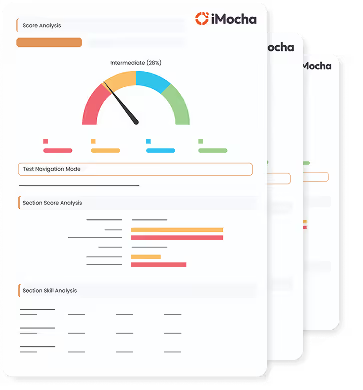


Choose easy, medium, or tricky questions from our skill libraries to assess candidates of different experience levels.
Choose easy, medium, or tricky questions from our skill libraries to assess candidates of different experience levels.

Choose easy, medium, or tricky questions from our skill libraries to assess candidates of different experience levels.

Choose easy, medium, or tricky questions from our skill libraries to assess candidates of different experience levels.
This a comprehensive PDF report, which you can instantly download and share with your hiring team or candidates for seamless collaboration.
Download Sample Report



iMocha's financial accounting assessment test enables recruiters and hiring managers to hire job-fit candidates effectively and make unbiased hiring decisions. This test is useful for hiring Financial Accountants, Assistant Financial Accountants, and Financial Reporting Accountants. Our test has helped our customers to reduce cost to hire by 40%.





%20(1).webp)
Financial accounting involves the preparation of financial statements and reporting of financial transactions pertaining to any business. Financial accounting uses standardized guidelines to make financial reports, transactions, income statements, balance sheets, etc., used to keep records. Financial accounting online test helps recruiters and hiring managers with a reliable way to evaluate the financial accounting abilities of potential employees.
Two important use cases for Financial Accounting test
#1 Identifying job-fit candidates based on job roles
You can create customized skill assessments for any given job role. Using this feature, you can choose questions from different skill types, including functional, technical, and soft skills. For example, with our customized Financial Accounting assessment test, you can evaluate candidates' knowledge of Product Costing, Profit Center Accounting, Fixed Assets, General Ledger, and Problem-solving Skills and assess the best individuals for the job.
#2 Skill-gap analysis of your employees
iMocha allows you to measure employees' skill competency through the Accounting and Finance tests. It determines the existing skill level and identifies the areas for growth. It also measures the knowledge and impact of training and traces individual employees' progress. For example, you can use our Finance and accounting competency test to identify a consultant's knowledge about Financial Accounting, Cost Element Accounting, and other skills and perform a skill gap analysis.

The Financial accounting assessment test helps to screen candidates who possess skills as follows:
• Good knowledge of accounting fundamentals.
• Experience in accounts receivable and accounts payable
• Understanding financial areas like balance sheets, cash flows, accounting principles, etc.
• Hands-on experience in carrying out certain tasks like journal entries, ledger entries, valuation ratio analysis, etc.
• Familiarity with data interpretation skills and excel skills.
Assessing candidates with a Financial Accounting online test is secure and reliable. You can use our role-based access control feature to restrict system access based on the roles of individual users within the recruiting team—features like window violation and image and video proctoring aid in detecting cheating during the test.







.webp)
.webp)
.webp)
.webp)





